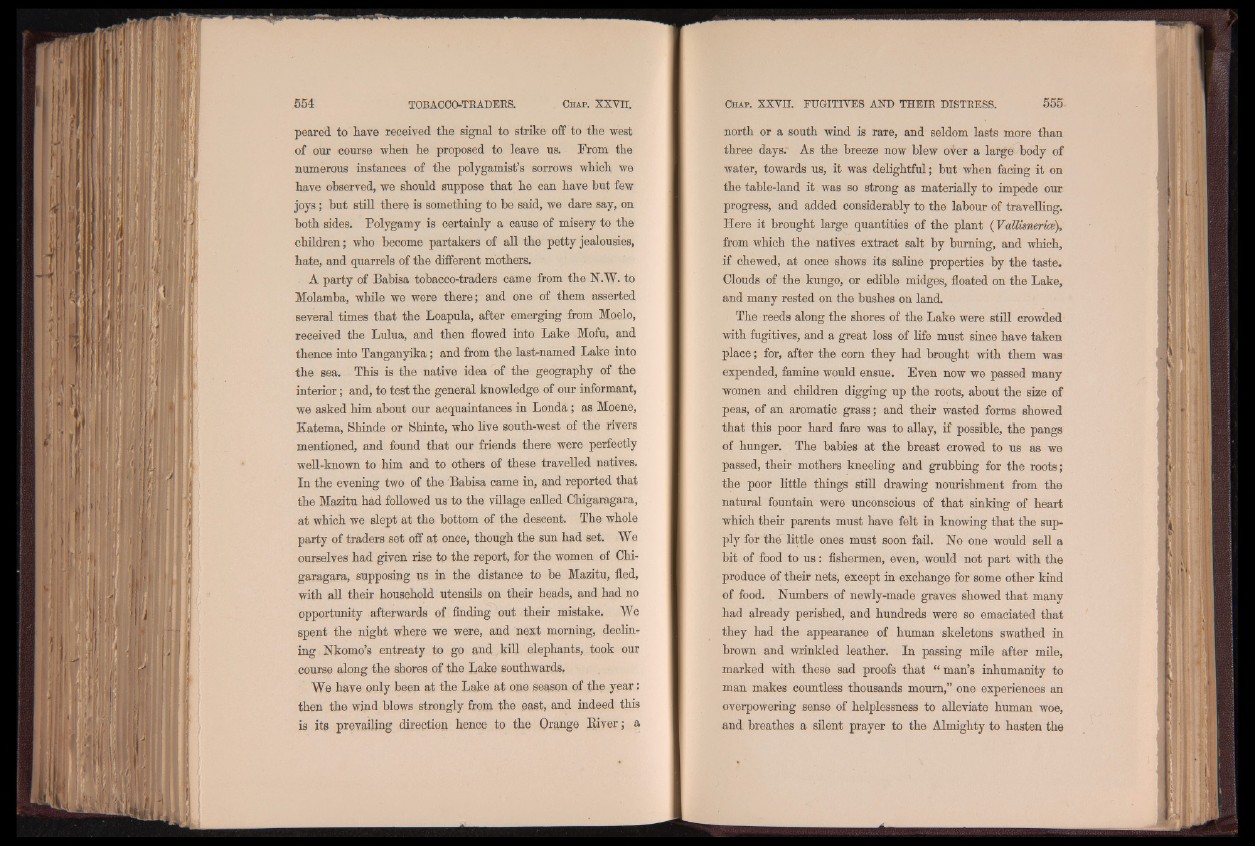
peared to have received the signal to strike off to the west
of our course when he proposed to leave us. From the
numerous instances of the polygamist’s sorrows which we
have observed, we should suppose that he can have but few
joys; hut still there is something to be said, we dare say, on
both sides. Polygamy is certainly a cause of misery to the
children; who become partakers of all the petty jealousies,
hate, and quarrels of the different mothers.
A party of Babisa tobaeeo-traders came from the N.W. to
Molamba, while we were there; and one of them asserted
several times that the Loapula, after emerging from Moelo,
received the Lulua, and then flowed into Lake Mofu, and
thence into Tanganyika; and from the last-named Lake into
the sea. This is the native idea of the geography of the
interior; and, to test the general knowledge of our informant,
we asked him about our acquaintances in Londa; as Moene,
Katema, Shinde or Shinte, who live south-west of the rivers
mentioned, and found that our friends there were perfectly
well-known to him and to others of these travelled natives.
In the evening two of the Babisa came in, and reported that
the Mazitu had followed us to the village called Chigaragara,
at which we slept at the bottom of the descent. The whole
party of traders set off at once, though the sun had set. We
ourselves had given rise tp the report, for the women of Chigaragara,
supposing us in the distance to be Mazitu, fled,
with all their household utensils on their heads, and had no
opportunity afterwards of finding out their mistake, We
spent the night where we were, and next morning, declining
Nkomo’s entreaty to go and kill elephants, took our
course along the shores of the Lake southwards.
We have only been at the Lake a t one season of the year:
then the wind blows strongly from the east, and indeed this
is its prevailing direction hence to the Orange Biver; a
north or a south wind is rare, and seldom lasts more than
three days: As the breeze now blew over a large body of
water, towards us, it was delightful; but when facing it on
the table-land it was so strong as materially to impede our
progress, and added considerably to the labour of travelling.
Here it brought large quantities of the plant (Vallimerice),
from which the natives extract salt by burning, and which,
if chewed, at once shows its saline properties by the taste.
Clouds of the kungo, or edible midges, floated on the Lake,
and many rested on the bushes on land.
The reeds along the shores of the Lake were still crowded
with fugitives, and a great loss of life must since have taken
place ; for, after the corn they had brought with them was
expended, famine would ensue. Even now we passed many
women and children digging up the roots, about the size of
peas, of an aromatic grass; and their wasted forms showed
that this poor hard fare was to allay, if possible, the pangs
of hunger. The babies at the breast crowed to us as we
passed, their mothers kneeling and grubbing for the roots;
the poor little things still drawing nourishment from the
natural fountain were unconscious of that sinking of heart
which their parents must have felt in knowing that the supply
for the little ones must soon fail. No one would sell a
bit of food to u s : fishermen, even, would not part with the
produce of their nets, except in exchange for some other kind
of food. Numbers of newly-made graves showed that many
had already perished, and hundreds were so emaciated that
they had the appearance of human skeletons swathed in
brown and wrinkled leather. In passing mile after mile,
marked with these sad proofs that “ man’s inhumanity to
man makes countless thousands mourn,” one experiences an
overpowering sense of helplessness to alleviate human woe,
and. breathes a silent prayer to the Almighty to hasten the